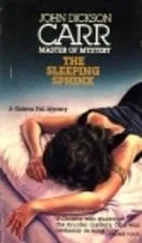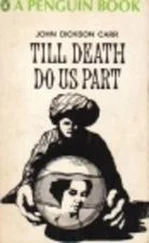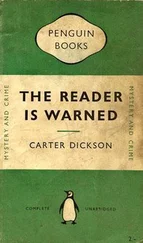'You understand, at this point I was just sittin' and thinkin'; I'd got no more than an idea to roll about. Someone close to him, says I. Now, while it was theoretically possible for an outsider to have sneaked in and done it (like Fleming, to take an example), still this looked very doubtful. Fleming wasn't an intimate; he wasn't even a close friend, as you can easily tell from the way they speak of each other. Furthermore, an outsider would have had to sneak past a battery of watchful eyes composed of Dyer and Amelia Jordan, one of whom was in the house all the time. Still grantin' that it's possible, take the other theory and see where it leads.
'It leads to the belief that the other confederate must 'a' been either Amelia Jordan or Dyer. That's so simple that it takes a long time before it can fully penetrate. But it pretty certainly wasn't Dyer. I'll say nothin' of my own belief that the painfully respectable Dyer was the last person that the painfully respectable Mr Hume would admit to a peep at any family skeletons from inside the cupboard. As a witness to Captain Reginald's gibberin' lunacy, yes. As a colleague, no. And that it couldn't have been Dyer is clear from the time-table.
'Like this: I'd already come to the conclusion, from reasons you know, that Hume was murdered with that arrow fired from a cross-bow. Somebody had to wait until Jim Answell was under the influence of the drug. Somebody had then to go into the study with Hume, assist in pourin' mint-extract down an unconscious man's throat, and get the other decanter and syphon out. Somebody had to make a pretext for takin' the arrow out of the room. Somebody had to get Hume to bolt the door; how Hume was to be persuaded to do this, with the arrow still outside the door, I didn't know. Somebody had to work the mechanism of the Judas window. Somebody had to kill Hume, close up the window, dispose of the cross-bow and the decanter, and generally tidy up. You follow that?
'Well, Dyer let Jim Answell into the house at 6.10. (Established.) It was three minutes at least before Answell took that drugged drink in the study, and longer than that before it hit him over the brain. (Established by Answell himself.) Dyer left the house at 6.15. (Established by me; I put into the right-hand column of my time-table, where I've put only absolutely unquestionable facts, that he got to the garage at 6.18; and, as he himself correctly said at the trial, the garage is a three or four minutes' walk away.) Is it possible to think that in the space of a minute and a half he went through all the hocus-pocus necessitated by Avory Hume's murder? It IS not. The time-element makes it impossible.
'Which brought me up against the revealin' fact that Amelia Jordan was the only person who was known to be alone in the house with Hume and an unconscious man. And she was alone there for seventeen minutes, until Dyer returned with the car at 6.32.
'Oho? Think about this woman for a minute. How would she fulfil the specifications for somebody who'd horned into the plot? She'd been livin' with the Humes for fourteen years: fourteen years, my children, which is certainly enough to qualify her as a member of the family. She was, or seemed to be on the surface, fanatically devoted to Avory. When she got excited - as you noticed she did at the trial - she called him by his first name, which was more than anybody except his own brother had the nerve to do. She was in a position to find out a good deal of what was goin' on in that house. If Avory had to confide his design to anybody, the likeliest person seemed to be a practical, swift-workin', hard-workin' woman who'd been there long enough to grow up in the closed circle of the family honour.
'Still only theories, d'ye see: so let's look at what she did durin' those mysterious seventeen minutes between 6.15 and 6.32. At 6.30 (she says) she came downstairs after having finished packin' the bags. Here I'll ask you to follow the testimony she gave at the trial, because it was exactly the same testimony she gave the police a long time ago - when I studied it with uncommon close care, like everybody else's testimony. She says she packed a small valise for herself and a large suitcase for Uncle Spencer, and then down she came.
'Now right here is an interestin' bit from Dyer's testimony which fits into that. Dyer returns and finds her standin' in front of the study door - in front of the study door, mark'ee. She flies info a wailin' frenzy, tells him that the fellers inside the study are killing each other, and orders him to run next door after Fleming. At this time, says Dyer, "she fell over a. big suitcase belonging to Dr Spencer Hume".
'I rather wondered what that suitcase was doin' back in the passage that leads to the study. The main staircase in that house - you've seen it, Ken - is towards the front. It'd mean that she walked downstairs with the bags; and, intendin' to go to the study to say good-bye to Avory, she walked back into the little passage still carryin' the bags -or at least, you notice, the suitcase. What's the game? When people come downstairs with a couple of bags, my experience is that they always plump 'em down at the foot of the stairs where they'll be convenient for the front door. People don't go to the trouble of luggin' 'em to the back ' of the house and walkin' about with them firmly clutched While they say good-bye.
'Right here I began to get a strange, burnin' sensation at the back of the brain. I began to see things. I wrote a question-mark on my time-schedule opposite Amelia Jordan's activities. Just what did I know, so far, about the murder? For my certain beliefs as opposed to the police's, I knew that (a) Hume had been killed with an arrow fired from a cross-bow through the Judas window, and the cross-bow had been missin' from the shed ever since that night; (b) Amelia was the only person who had been alone in the house for seventeen minutes; (c) Amelia was found near the study door in the inexplicable lovin' company of a large suitcase, which nobody seems to have heard of since that time; and then there fell into my obtuseness the fact that (d) Uncle Spencer's fine tweed suit had been missin' out of the house since that night.
‘Wow! We even know when that suit was found missin'. Directlv after the discovery of the murder, you'll observe, Randolph Fleming conceives the idea of takin' the prisoner's finger-prints. Dyer mentions that there's an ink-pad upstairs in the pocket of Spencer's suit. Dyer flies up to get it - and the suit's gone. Dyer can't understand it, and comes downstairs in a weird state of perplexity. But where was the suit? If everyone hadn't been rattled off balance by the discovery of a murder, where's the first place you'd have thought the suit must be? Hey?' There was a silence.
'I know,' said Evelyn. 'You'd know it must have been packed.'
'Sure,' agreed H.M., spitting out smoke and glowering. 'A certain woman had just finished packin' a bag for the owner of that suit. Uncle was goin' into the country for the week-end. Well, what the jumpin' blazes is the first thing you think of shovin' into a suitcase for a man who is goin' to do that? A tweed sports suit, my England.
'Follow this not-too-complicated line of thought. At 6.39, you'll see by your table, Fleming asks Amelia to go to the hospital and get Spencer. At the very same time and in the very same breath, he tosses out the idea of takin' the finger-prints. If only, he says, they had an ink-pad. Dyer mentions the one in the golf-suit, and goes to get it. Mind you, as you'll see in the table, the woman is still there. She hears this. Why, therefore, don't she up and say: "It's no good going up and looking for that suit; I've got it in the suitcase right out in the passage"? (Even if she's taken the ink-pad out of the suit before packin' it, she'd say: "Don't look in the suit; I've put the ink-pad in such-and-such another place.") In either event, why don't she speak up? She can't have forgotten she packed it so recently; and she's a severely practical soul who's learned to think of everything in Avory Hume's employ. But she says nothin'. Why?
Читать дальше








